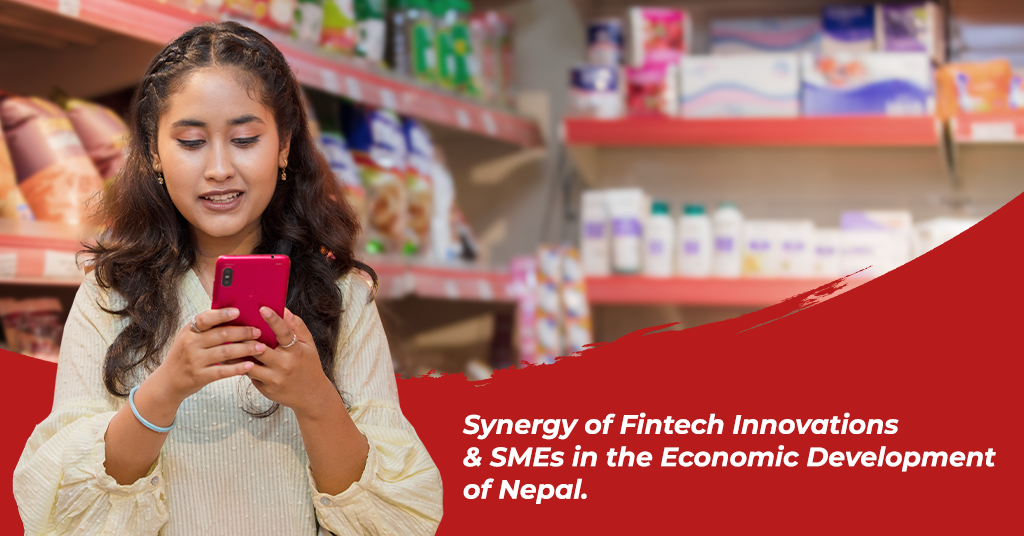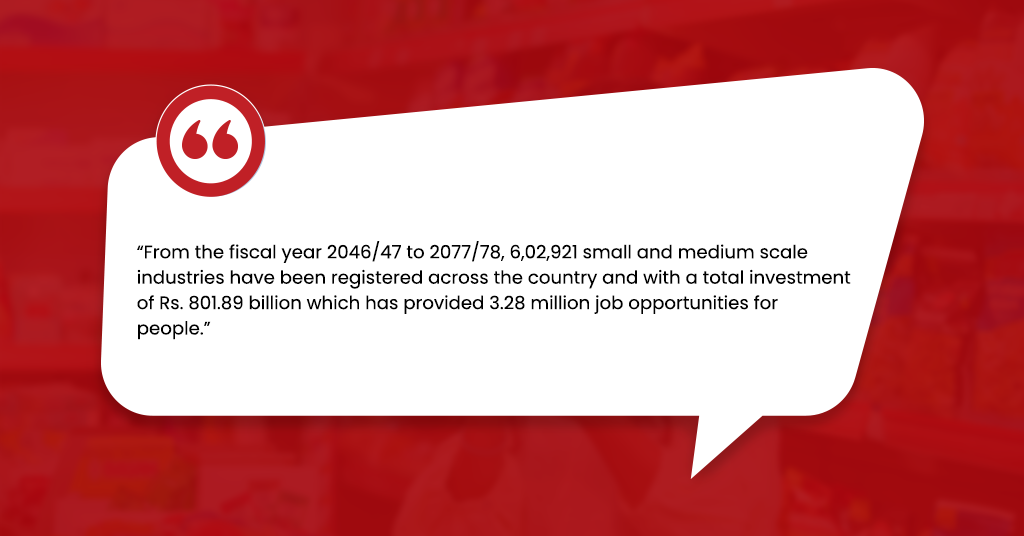
Nepal, a land of diverse cultures and breathtaking natural beauty, is also a nation striving for economic development and prosperity. While the country aims to achieve its full potential in economic boost, the bond between fintech innovation and SMEs accounts for exciting opportunities in achieving sustainable development and financial inclusivity. Small and medium-sized enterprises (SMEs) comprise a substantial part of the economic activity of developing countries. In the context of Nepal, the role of SMEs is often relatively greater. SMEs play a crucial role in fostering self-employment opportunities, utilizing local resources, and raising the income of rural residents. It plays a vital role in shaping the country's economic development landscape. Additionally, SMEs foster a culture of creativity and adaptability by promoting local entrepreneurship and innovation. In a country like Nepal, where large-scale industries might face challenges, SMEs offer a promising path for inclusive and sustainable economic development, enhancing livelihoods and boosting overall economic growth.
“From the fiscal year 2046/47 to 2077/78, 6,02,921 small and medium scale industries have been registered across the country and with a total investment of Rs. 801.89 billion which has provided 3.28 million job opportunities for people.”
Source: People’s Review

As per the article published in the Kathmandu Post, there are more than 9,23,000 registered businesses in Nepal. Among them, approximately 12% are SMEs which facilitate 40% of employment opportunities in the country. Despite their prominent contribution to the economy and job opportunities, they face constraints in growth due to a financial gap. As a result of the ongoing economic instability, inflation, higher expenses of doing business, lack of business rules of conduct, legal protection in transaction commitments, and high-interest rates charged by banks, SMEs are now exposed to a variety of risks and difficulties, including a high likelihood of going out of business. These difficulties must be overcome, or else the Nepalese SMEs risk losing out to international competitors.
Fintech Innovations in Mitigating Challenges for SMEs
Financial Technology in short Fintech, encompasses a wide range of technological advancements aimed at reshaping traditional financial services. At its core, fintech is primarily used to assist companies, business owners, and consumers in better managing their financial operations. From mobile banking to digital payments, fintech innovations are revolutionizing the way businesses and consumers engage with money. Additionally, fintech innovations have emerged as a transformative force in addressing and mitigating challenges faced by Small and Medium Enterprises (SMEs). From streamlined digital lending processes to digital payment solutions, fintech is revolutionizing how SMEs access capital and manage cash flows. In this article, we will be discussing the synergy between fintech innovations and SMEs and how fintech innovations help in mitigating challenges for SMEs.
1. Streamline Payment Process
Fintech innovation plays a pivotal role in streamlining payment processes for SMEs by introducing efficient and user-friendly solutions. These advancements enable SMEs to accept various payment methods, such as digital wallets and online transfers, simplifying transactions for both customers and businesses. Moreover, the introduction of the QR payment system has streamlined the payment process to the next level. While using cash for business transactions, various problems may arise. Counting and verifying cash transactions can be time-consuming which will slow down daily processes and affect customer service. Likewise, carrying and handling large amounts of cash can expose businesses to security risks such as theft, robbery, or employee mishandling. Due to the lack of transparency in cash transactions, it brings out challenges like tracking and recording transactions accurately.
The digital payment process eliminates the need to continuously count and check cash. Thus, with the aid of fintech innovation, SMEs can embrace contactless payment options which accelerate the payment process. Additionally, it also provides quick access to funds, enhancing cash flow management.
2. Access to Capital
Fintech innovation has emerged as a crucial lifeline for SMEs looking for capital. The introduction of Foneloan, a digital lending platform in 2019, has reshaped the landscape of lending business in Nepal. The traditional lending process presents several challenges that often hinder businesses seeking financial support. The traditional lending process requires substantial time due to its lengthy application steps and paperwork. Due to these reasons, the people involved in the business have problems in getting access to capital.
With Foneloan, you can get instant capital access up to Rs. 2 lakhs without the need for any paperwork and bank visits. This allows small and medium-level enterprises for instant capital to invest in their business. To be eligible for getting Foneloan through your mobile banking app, the business merchants should accept their payment via digital transactions methods including QR codes and IBFT. Depending upon their digital transactions, merchants are given a tailored loan. Additionally, entrepreneurs running SMEs can also take advantage of flexible loan repayment.
Anish Tamang, who is running a successful SMEs business in Nepal has his say about Foneloan service,
“Foneloan has transformed my business's growth journey. Their seamless digital lending platform provided me with swift access to the capital I needed. Unlike traditional banks, Foneloan provided me with a tailored loan that aligned perfectly with my needs. Thanks to Foneloan, I could seize opportunities, expand my operations, and propel my business forward.”

3. Digital Accounting and Record Keeping
Another correlation between fintech innovation and SMEs includes digital record keeping. Using cash transactions in business doesn’t provide transparency. Therefore, keeping records of those transactions can be a hectic task. Fintech products like mobile banking and digital wallts have made accounting and record-keeping easier for SMEs, replacing manual processes with digital efficiency. Additionally, entrepreneurs can also view their transaction statements in real time due to which they can keep a record of their finances.
Here’s what, Bikash Shah, owner of Balkumari Hardware, has his say about his experience of using mobile banking,
“Mobile Banking changed the game for me. Keeping track of financial records became simple with just a few taps. No more paperwork headaches! Plus, the real-time tracking of financial transactions has helped my business a lot. It's like having a personal accountant in my pocket.”

Challenges and Barriers While Adopting Fintech Innovations By SMEs
The adoption of fintech products offers substantial advantages to small and medium-sized enterprises (SMEs) that can significantly enhance their operations and growth prospects. Fintech solutions provide streamlined and convenient access to financial services, enabling SMEs to manage their finances more efficiently. Furthermore, fintech tools facilitate faster and more accurate payment processing, improving cash flow management. Overall, the integration of fintech into SME operations empowers these businesses to remain competitive and agile. While the adoption of fintech solutions brings numerous benefits, there are also several challenges and barriers that SMEs might face when trying to adopt fintech solutions.
Many owners who are operating SMEs might not be financially literate. Therefore, they might not fully understand how these technologies work and how they could integrate them into their existing operations. Similarly, fintech products require internet connections. In some regions, SMEs might lack reliable internet access, which makes adopting fintech solutions challenging or even impossible. Additionally, the financial sector is heavily regulated by the government to protect consumers and maintain financial stability. Thus, SMEs may face challenges in understanding and adhering to these regulations when implementing fintech solutions.
Thus, these challenges must be adhered to before adopting fintech solutions by SMEs. As SMEs contribute about 22% to the country's GDP, creating over 1.7 million job opportunities. Therefore, the government bodies should develop monetary policies that will benefit small and medium level enterprises. On the other hand, the government should also focus on providing financial literacy programs that help SMEs navigate the fintech landscape.